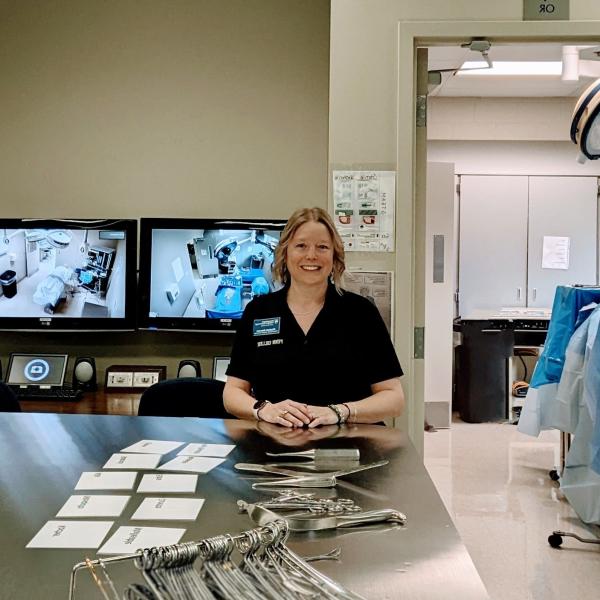Elizabeth Gizenski
- Faculty
- Surgical Technology
At Penn College, surgical technology students get 500-700 hours of clinical experience. Working alongside experienced professionals like Elizabeth, surgical technologists in training get hands-on experience in real-life settings. Meet our clinical director who brings 20+ years of expertise and find out what she loves about the program.

Q&A with Elizabeth
WHAT MAKES PENN COLLEGE SPECIAL?
Penn College does not just offer an education, it cultivates a dynamic campus life with a strong focus on serving its student community. From exciting events to dedicated support services, Penn College goes the extra mile to ensure a vibrant and enriching experience for all students.
WHAT'S THE MOST REWARDING PART OF YOUR JOB?
Building meaningful relationships with students as an advisor, guiding students on their path to academic and personal success, and journeying with students every step of the way.
WHAT ATTRACTED YOU TO A CAREER IN SURGICAL TECHNOLOGY AND HOW DID THAT PROGRESS INTO NURSING?
A friend’s mother was a surgical technologist and I thought that the career sounded interesting. While I worked in food service at the hospital, I went to Penn College to earn my degree in surgical technology. I transferred to the operating room where I spent several years scrubbing for a variety of procedures. As I grew comfortable in my position, working alongside nurses every day sparked my interest in nursing. The path wasn't easy, juggling work and studies, but earning my nursing degree opened doors I never imagined.
WHAT QUALITIES MAKE SUCCESSFUL SURGICAL TECHNOLOGISTS?
- Resilience
- Ability to handle tough situations
- Ability to work under pressure
- Focus and attention to detail
- A strong sense of teamwork and collaboration
- Ability to adapt to unexpected situations and make quick decisions
- Be an active listener with clear, concise communication skills
WHAT IS THE MOST COMMON QUESTION YOU GET AT OPEN HOUSE?
What do surgical technologists do? What is surgical technology?
WHY IS HANDS-ON EDUCATION SO VALUABLE?
Hands-on education is valuable because it throws you right into the thick of things. You are not just learning concepts – you are actively applying them in a real-world setting. This immersion helps you develop a deeper understanding of the material. Hands-on learning also involves working with experienced mentors or instructors. These experts can share their knowledge and practical tips in a way that textbooks simply cannot. By observing and working alongside them, you gain valuable insights and hone your skills through real-time feedback.
WHAT HAS BEEN YOUR PROUDEST MOMENT AS AN INSTRUCTOR?
Seeing the skills and knowledge we helped instill come to life as I work alongside our graduates, is a constant source of pride.
WHAT ARE EMPLOYERS SAYING ABOUT PENN COLLEGE GRADUATES?
We need more!
Programs
Surgical Technology
From procedures and protocols to specialty instrumentation, surgical technologists master it all.
All Programs
Unsure which major is right for you? See all academic programs at-a-glance.
